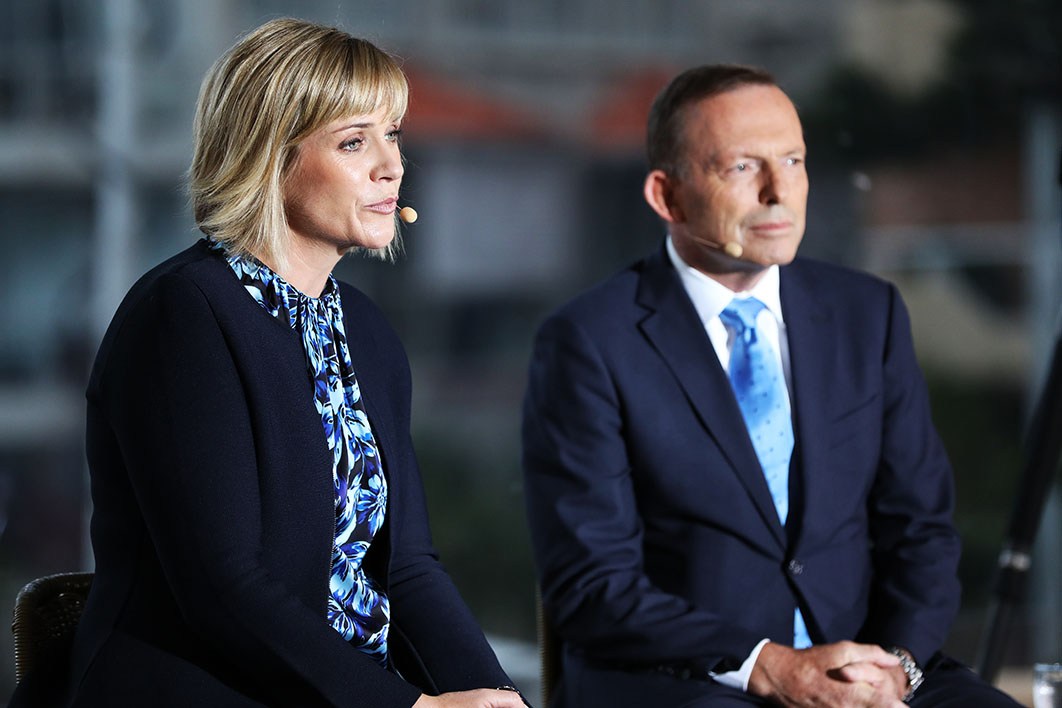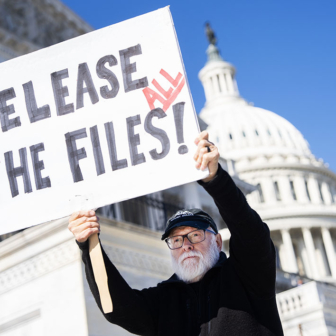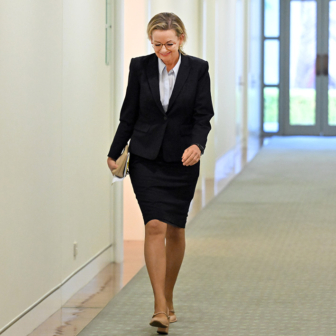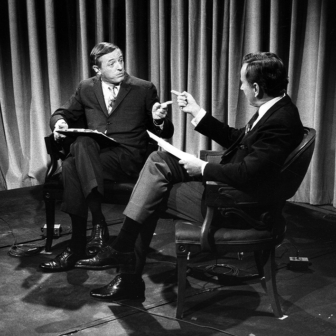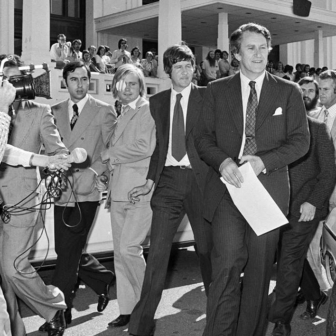If Zali Steggall manages to replace Tony Abbott as the member for Warringah, it will be the first time since the seat was created almost a century ago that its electors send not only an independent to Canberra, but one with a progressive agenda. Steggall has been pitching to the “sensible centre,” and her outlook on bread-and-butter issues is certainly conservative. Yet her campaign’s focus has been on climate change, where her policies lean to the left of Labor’s. And there’s another reason why the campaign may be a game-changer, one that hasn’t been explicitly noticed but may have helped fuel the animus against Steggall.
Just look at the ballot paper for Warringah. Six of the ten candidates are women. Once we would have considered this extraordinary; now, it hasn’t rated a mention. But only Steggall has a real chance of winning, and the smears against her have been relentless: that she’s a stand-in for Shorten, that she drives a Nissan Pathfinder instead of an electric car, that she’s always sought the limelight (this from her ex-husband and his partner), that she only came third in the Olympics (and, what’s more, has never helped anyone to follow her lead). If they’re nowhere as bad as the slurs slung at Gillard, which we can take as progress, they’ve been bad enough.
The most persistent canard is that she’s a stooge of GetUp! But GetUp! not only hasn’t sponsored her, it also hasn’t done her any favours. Its notorious YouTube ad, with an Abbott look-alike ignoring the cries of a drowning surfer, outraged many in the electorate, and not all of them by any means were Abbott supporters. The organisation’s Miriam Lyons admitted it was a “screw up,” especially with seven swimmers having recently drowned — two of them, like Abbott, being lifesavers. The furore was a gift to Abbott, and the mud splashed on Steggall, who’d had nothing to do with it and was fuming herself.
Now, in the home stretch, the campaign is getting quite fierce. A female GetUp! doorknocker told me of being verbally abused by a male Abbott doorknocker, and Abbott himself has been the target of some shockingly offensive posters. The big black Advance Australia trucks bracketing Steggall with Shorten still crawl through Warringah’s streets, and the smears about her persist. But apart from an attack by Miranda Devine in the Telegraph and a battery of scattergun indignation about the GetUp! ad on the Australian’s letters page, Steggall has been getting pretty good media.
Having accepted I wasn’t much chop at letter-writing, I had a go on social media. I started with the Manly Daily, which has opened up its Facebook page to the local contest. Most of the comments expressed deep dissatisfaction with Abbott, but now and then one in his favour popped up, extolling his volunteer firefighting and lifesaving, or his having been a prime minister and a Rhodes scholar. Some bagged Steggall for the usual stuff, or for having a “ski nose.” Greens were characterised as “whackjobs.” Some of the more robotic comments were confirmed to be posted by trolls, and when they were sprung the language got truly vile. In some instances, legal action was threatened. It wasn’t exactly the dark web, but it wasn’t a great place to spend much time either.
Steggall’s supporters, myself included, tried to inject facts and raise the level of argument, focusing on Abbott’s record over twenty-five years as Warringah’s representative rather than his academic performance or enthusiasm for volunteering. The nastiness, though, set me wondering if the effort was worth it, and if democracy could ever survive this.
It was with some relief, then, that I arrived at the Hotel Steyne on Manly’s waterfront to attend a women’s forum featuring the candidate and three other women. Decades after we won gender equality in bars I still feel strangely nervous entering one, but two rows of turquoise Steggall t-shirts made me feel at home, and the mood was decidedly more upbeat than mine had been after wrestling with trolls. When the message came that the forum was about to begin, I climbed the stairs to a room with seats for one hundred, all quickly filled, and found one at the front.
The organisers were a group called Connecting Women, and each of the other panel members had initiated feminist projects in various, mainly corporate, settings. Steggall’s old friend Layne Beachley opened the proceedings with a heartfelt endorsement and some choice words about what it took to succeed in surfing and in life itself. Then Steggall told us why she’d put herself forward as a candidate. She had been dismayed by Abbott’s behaviour over marriage equality and, of course, his obstructive positions on climate change, but the catalyst was the shabby treatment dished out to Julie Bishop during last year’s Liberal leadership coup.
The moderator then put questions to the panel. The others answered briefly and impressively, quoting figures on women’s slipping workforce participation, the 90 per cent effective marginal tax rate created by childcare costs, the gap in gender pay and so forth. Unsurprisingly, though, this was primarily a chance for Steggall to discuss her positions on key campaign issues.
On transport congestion and “the tunnel” (with a swipe at Abbott for his recent ardent embrace of it) she observed that it’s been twenty-five years since any major infrastructure was funded in Warringah, so in principle she was in favour of it. In any case, she took it as a given — a state government project for which preparation was well advanced. But she wanted the air vents to be filtered, along with an electorate-wide reduction of particle pollution through the wholesale adoption of electric-powered vehicles, inside the tunnel and without.
Most interesting — and at odds perhaps with the confident, corporate flavour of the proceedings — was her passionate position on refugees. Steggall called for a bigger refugee intake, though she was reluctant to put a number on it, preferring that it be “crisis-driven” to enable Australia to quickly respond to catastrophes expected with global warming. She was also opposed to offshore detention, especially for children, and had liaised with Wentworth’s Kerryn Phelps over the medivac legislation.
When questions were opened to the audience, the first, on the situation for older women, was asked by the candidate’s mother, Susan Steggall. There were appreciative laughs as Zali acknowledged the questioner’s identity, and she went on to discuss how two decades of Australian women’s lowered workforce participation was affecting their financial situation in later life.
For me, and for the old Women’s Electoral Lobby stalwart sitting next to me, there was a sense of deja vu. Here were the same problems that had galvanised us feminists in the 1970s. It was heartening — but also saddening — to hear them lamented by this new generation of women, who we laughingly conceded were considerably better dressed than we had been, back in the day. It was telling, too, that the word “feminist” wasn’t uttered throughout the evening. Never mind, the content was there in spades.
This was also the day pre-polling began. There was a surge of early voters, and volunteers were out at the polling stations. The Steggall volunteers I’d spoken to outside the Manly booth seemed cautiously optimistic. For the first time in the fifteen years I’ve been back in the electorate, electors reported getting robot calls from pollsters.
Two days later, the Sky News debate between Abbott and Steggall was streamed on the Manly Daily’s website for those who couldn’t make it to the Queenscliff Surf Club, Abbott’s home ground. Queenscliff is the most conservative of Manly’s three surf clubs, Abbott its most prominent member, but Steggall’s supporters were there in force, inside and outside the venue, and her performance was outstanding.
Okay, I’m biased, but that doesn’t mean I’m not observant. She was articulate and on top of the issues, more than a match for the seasoned Abbott. His arguments seemed weak and shopworn, and he had the look of a man who had seriously underestimated his opponent’s passion and competence. But one commentary I’ve come across had me puzzling. Conceding Steggall the winner, the writer deemed Abbott “more likeable.” Why, I wonder? Because he mingled with the audience after the debate had finished? Or did it represent something different — that old, coded fear of the too-powerful woman?
Two days later, the schoolkids’ climate protest was on, despite the predicted rain. My cautious estimate is that a couple of hundred turned up, from primary school kids to their parents and grandparents. The stars were the high school students. They had been the organisers and were now the moderators and speakers. They were knowledgeable and determined, totally clued up about the dangers awaiting them if effective action isn’t taken in the twelve-year window we have left to us. The other remarkable thing about these speakers was that every one of them was a girl.
The rally was in the Sydney Road plaza outside Abbott’s third-floor office, though the impassive darkened windows made it hard to tell if Abbott or his staff were paying any attention. But the girls weren’t letting our local member off the hook, and afterwards a couple of them confronted him in Hemingway’s, a popular cafe on the beach.
The students did their best to put their case, but they were then treated to a lecture, first on the need to factor in the cost of remedial action, then on how climate had changed through time. “The ice age was climate change,” the member for Warringah informed them, “the Roman warm period was climate change, the medieval warming, the mini ice age…” The kids were gobsmacked. So was I. If there was any single reason to remove this man from office, this would have to be it.
The climax of all this was the big Vote Tony Out rally on Sunday. As I walked towards Gilbert Park, where the march was beginning, I passed the pink party bus from Wentworth and the women and men in their pink Vote Women t-shirts. The crowd at the park was bristling with excitement and witty signage. As we marched down The Corso towards the beach, I spotted the shop assistants in their doorways chanting and clapping with us. A lone aggressive Abbott supporter was dealt with by the police.
Someone said a march like this — perhaps a thousand or more people — hadn’t been seen in Warringah since the big anti-conscription rally in the seventies. David Barr and Peter Macdonald, both former independent state parliamentarians and Manly mayors, spoke, and then Mark Kelly, the organiser, who has done more to get this movement off the ground than anyone. All are men, but from each of their lips came a woman’s name: Zali Steggall.
There’s something afoot in Warringah. There are women supporting Abbott, of course, and men who support Steggall and other progressive candidates. But as well as the generational divide (the median age here is now thirty-nine), there’s a gender one. Much of the misogyny is hidden, disguised by talk of cost and stability, and by the spray of meaningless numbers, but it’s palpable. You see it on the set faces of some men in the streets, their preponderance in the platoons of Liberals at the polling stations, in the condescension and aggressiveness of the kind displayed by Abbott himself, talking down to the students who, for all their naivety, know incalculably more about the world we’re inhabiting than he does. You see it too in the determination and fairmindedness of Zali Steggall and of her supporters. Maybe we won’t prevail in the countdown, but I’m in no doubt that the times, they have been a-changing. •
